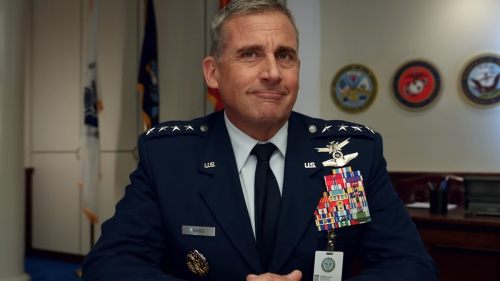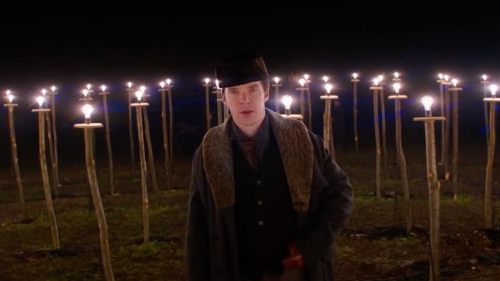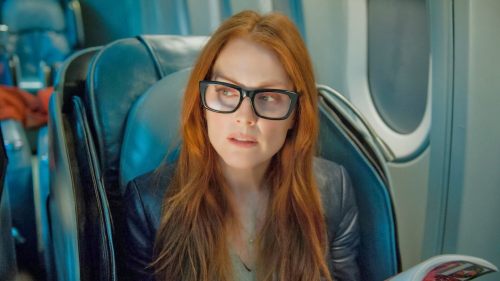FREEHELD Review: A Great Story, Blandly Told
Is it enough that I cried during Freeheld? Does that make it a good movie? Does it matter that I often rolled my eyes at aggressively maudlin scenes? Do my tears cancel out the extraordinarily jarring performance of Steve Carell, bursting in from a different movie like the Kool-Aid Man exploding through the wall? Should the politics of the film - clear and positive - make me like it more?
Freeheld is based on a powerfully emotional true story, that of New Jersey cop Laurel Hester forced to fight both cancer and prejudice. A closeted lesbian, Hester has given her whole life to the job, working her way up the ladder for 20 something years. Her partner is a gruff and tough cop, and they’re best friends. But when Laurel meets the boyishly butch Stacie Andree her walls crumble; a year after their first date the two are buying a house together and creating a life, even if it could threaten her position in the department.
The real threat, though, are the tumors growing in Laurel’s lungs. As she gets sicker she attempts to name Stacie the recipient of her pension, as allowed by Jersey’s then-new domestic partnership law. But a small loophole and some prejudiced local politicians mean bad news: the request is denied and Laurel has to be spend her last days alive fighting for her wife’s future.
The story is powerful, but the movie is not. It’s a by-the-numbers weepie that is so obvious and surface level that you could call out each beat in advance. Screenwriter Ron Nyswaner wrote the seminal gays fighting for rights movie, Philadelphia, but none of that film’s verve is on display in Freeheld. Meanwhile Peter Sollett directs the film with maximum anonymity, and he never met a shot he couldn’t compose in the most blandly forgettable way imaginable. I think the film has about two or three striking visual moments; the rest of the film is simply the camera placed in front of the action, like a 1990s TV movie.
Perhaps the greatest tragedy in Freeheld is Julianne Moore, relegated to yet another disease of the week role (if she follows up this and Still Alice with another turn as a proudly dying woman we have a terrible trend on our hands). As Laurel gets sick Freeheld has nothing for her to do except wear progressively worse bald wigs. And as wasted as Moore is, Ellen Page is given even less to do, partially because she plays a woman who wants nothing to do with what is happening in the rest of the movie.
As those two have a profoundly standard weepie story (is it progressive that this boring procession from meet-cute to final breath is happening to lesbians? Should we be thankful that all sexual orientations can get standardized, surface level, montage-y love and loss stories?) there’s a second movie brewing. It’s a movie that’s more interesting but is also underserved - it’s the story of other people reacting to Laurel’s situation. There’s Michael Shannon as the partner, playing a one-note angelic role (unlike Denzel in Philadelphia Shannon’s cop is immediately and completely on Laurel’s side) that offers him little to do but spout platitudes with a Jersey accent. There’s Josh Charles as the town freeholder who actually wants to help Laurel but is afraid to vote with his conscience. And then there’s Luke Grimes as a closeted gay cop who is terrified to offer his support and come across as queer. There’s stuff here that has the makings of a gripping movie, but Freeheld skates through it all.
Now we come to Carell. Between Freeheld and Foxcatcher it might be wise to call a time of death on Carell’s ‘serious actor’ career. Both of these movies feature Carell playing not characters but SNL sketch caricatures, broad and cartoonish weirdos. In the case of Foxcatcher the version of John Du Pont that Carell played bore little resemblance to the real guy; I don’t know much about the real Steven Goldstein, the gay rights activist who inserts himself in Laurel’s fight, but I hope that in real life he’s more nuanced than the flouncing, mincing figure Carell cuts. The problem isn’t all with Carell; a better director would done something more interesting with the Paul Lynde levels of flamboyance Carell brings, would have had more scenes and more moments contrasting the working class Laurel with the activist. Instead Carell blows through like the Tazmanian Devil.
So yes, I cried during Freeheld. How could you not? The story is powerful on its own, the bravery of these women inspirational. But I cried despite the clumsy, almost generic movie featuring this incredible story, not because of it.
It's worth noting that Freeheld is an adaptation of the documentary of the same name, telling the story of Laurel and Stacee directly, and I would recommend seeking that film out instead.



